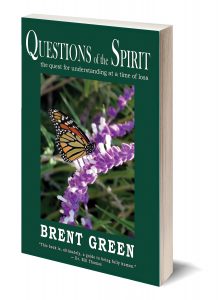
As is the situation for most readers over age 50, I have lost many significant persons in my life. I have lived through much suffering. After each loss, I grieved privately, rarely reaching out to others when I could have used some advice or a steady shoulder. I went through the stages of grief on my own, ignoring the depths of my suffering.
 Then last year I lost my sister to stage IV lungMy sister passed away while receiving hospice care. Mark McGann, an easygoing chaplain, visited Julie’s home a few days before she died. He asked our family members to gather with him around a dining room table. We were sleep-deprived, anxious, and grief-stricken. He then asked, “Is there value in suffering?”
Then last year I lost my sister to stage IV lungMy sister passed away while receiving hospice care. Mark McGann, an easygoing chaplain, visited Julie’s home a few days before she died. He asked our family members to gather with him around a dining room table. We were sleep-deprived, anxious, and grief-stricken. He then asked, “Is there value in suffering?”
When Chaplain Mark posed this question, our wife-mother-sister-grandmother was dying in the master bedroom ten yards away. That moment was as raw as life can be, Julie’s departure imminent, the question of her suffering our lingering concern. And without qualifications, we were all suffering.
But this question cut to the core of our palpable, immediate encounter with mortality. The question required us to get in touch with our feelings in those final hours before Julie passed and provided an avenue to start finding answers where sometimes there are no obvious responses.
At first I became analytical: suffering is fundamental to the human condition. Suffering creates a vivid contrast illuminating joy, happiness, and satisfaction. It is a harsh lesson on the other side of sublime. We all must suffer whether we choose to or not. There must be value in that which is given in our lives. But rationalization did not assuage my suffering nor suggest something positive about such dark grief.
Several weeks later as I reflected more about suffering after loss, I revisited the misty days following the deaths of our parents who had passed away less than one day apart in July 2000. I had existed in a thick, murky fog for months, slogging through days of routine and work, numb and disillusioned and distracted. Then my wife, Becky, and I decided we needed a spontaneous break from exhausting routine and unresolved grief, so we traveled to Amsterdam, Holland.
The Quest for Understanding and Acceptance When Suffering
We became spellbound with the ancient Dutch city, the canals, exceptionally friendly natives, and an all-pervading creative vibe. From Rembrandt’s original painting studio to a modern museum showcasing the magnum opus of Vincent van Gogh, we walked in the footsteps of the Masters.

I responded by taking hundreds of photos of the Dutch people being themselves, such as mothers on bicycles transporting towhead toddlers and innovative mimes frozen solid near intersections. I captured visual stories of a European setting very different from our home. I allowed my senses to take in all that life can offer if we are alert, present, and open to new experiences. And gently, numbing grief transformed into new possibilities: a satellite’s perspective of how my life might proceed forward productively.
When we returned from Amsterdam, I transformed my photos into digitally printed posters. Nine months after our parents had passed away, I hosted an exhibition at a popular gourmet coffee shop where my framed Amsterdam photographs remained on display for several weeks.

Without suffering I would not have traveled to Amsterdam when we did, nor would I have seen what I saw: transitory instants when visual elements aligned under optimum lighting conditions. I would not have mastered Photoshop so I could perfect my images for digital printing. I would not have taken creative risks involved in sharing my work in a gallery setting.
Helen Keller became afflicted by scarlet fever or meningitis at nineteen months. The illness left her sightless and deaf. Nevertheless, she became the first blind and deaf person to earn a Bachelor of Arts degree. She wrote and published twelve books and lectured worldwide. She experienced suffering from a perspective that would incapacitate many. Quite the opposite, she wrote: “Character cannot be developed in ease and quiet. Only through experience of trial and suffering can the soul be strengthened, ambition inspired, and success achieved.”
Suffering helped me comprehend once again what is useful and attainable in this life. Suffering motivated me to re-engage. I transformed the foreign, figuratively and literally, into the familiar. Suffering can precipitate creativity, liberating the creator through inspiration and then many available channels of human communication including painting, sculpting, songwriting, personal essays, poetry, photography, and videos. Therefore, I discovered there is value in suffering.
Provocative questions such as those posed by a humble hospice chaplain can help us reconsider our deepest values and beliefs at times of greatest grief and vulnerability. Answering unforeseen and challenging questions can become a path to greater spiritual awareness, a more resilient comportment, renewed faith, and optimism.
We may be just one question away from an entirely different life.

Available on Amazon. Click here.
We’d love your help spreading the word about Questions of the Spirit. Please share this book and website with your contacts on LinkedIn, Facebook and Twitter.